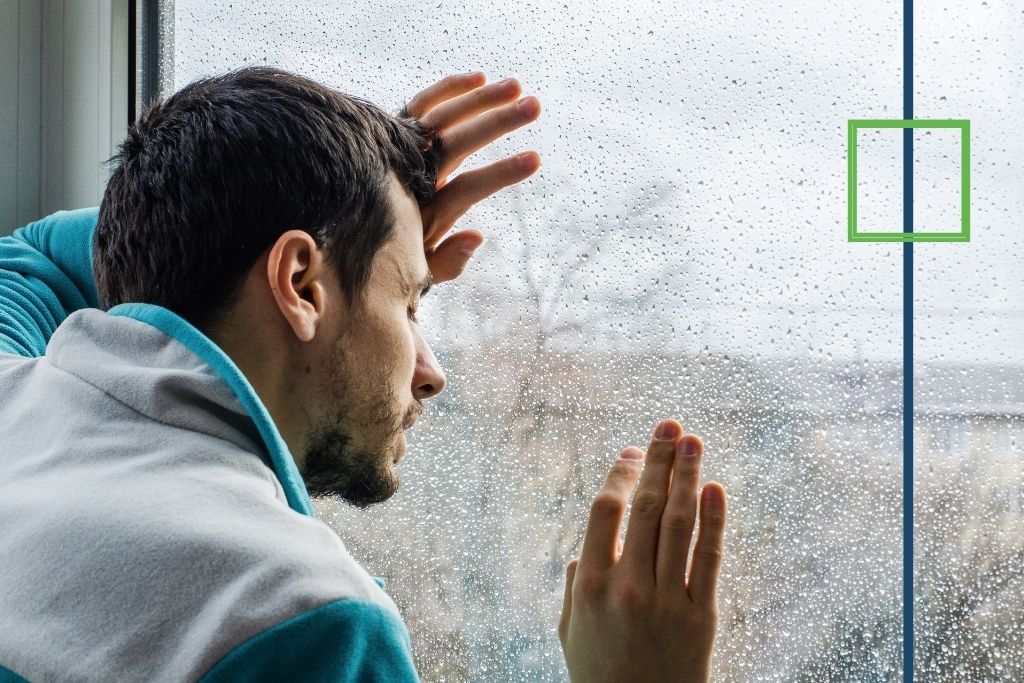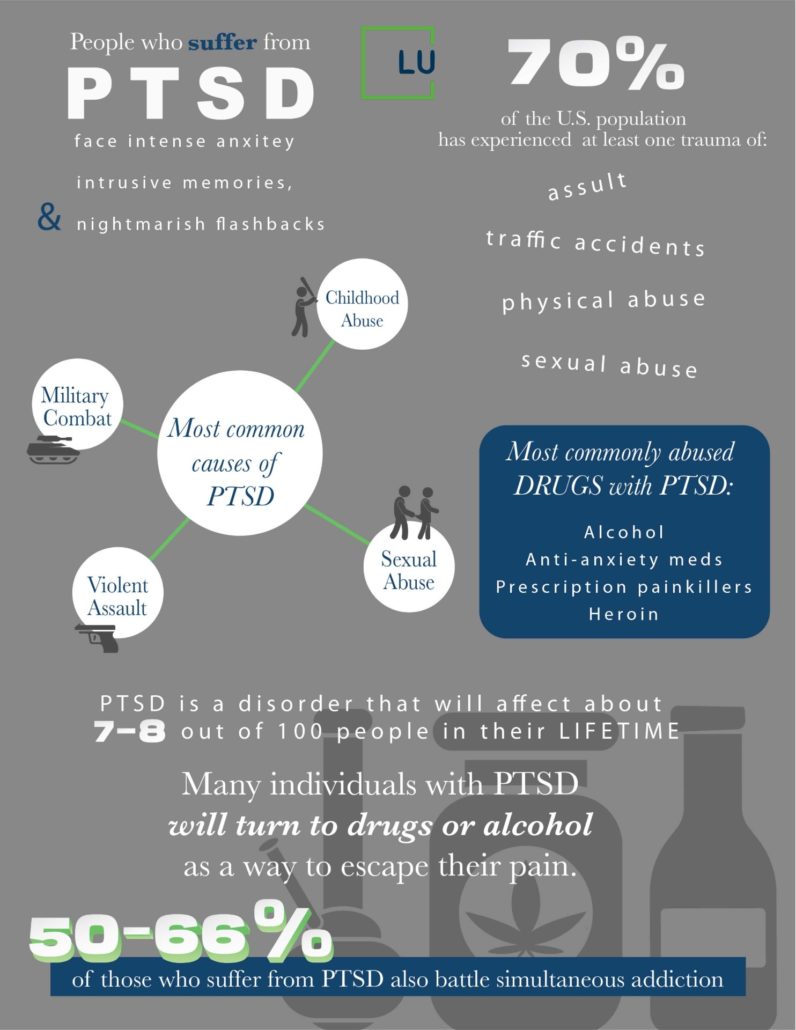What is PTSD?
Post-Traumatic Stress Disorder (PTSD) is a mental health problem that people may develop after seeing or undergoing a life-threatening event, like a car accident, combat, a natural disaster, or sexual assault.
Fear may trigger many split-second changes in the body to help defend against danger or to avoid it. Therefore, people who have PTSD may feel frightened or stressed, even when they are not in danger.
If symptoms last longer than a few months, it may be PTSD. This mental condition is often followed by depression, substance abuse, addiction, or other anxiety disorders. The good news is that there are effective treatments. PTSD and addiction are usually experienced together when there is a history of chronic substance abuse
Research from the National Center for Biotechnology Information (NCBI) [1] shows that exposure to traumatic experiences during childhood has been associated with alcohol or drug addiction, including dependence and abuse. Therefore, alcohol and drug addiction have a higher possibility to co-exist with Posttraumatic Stress Disorder (PTSD) and other mood-related mental health disorders. Ideally, individuals with PTSD and addiction problems should have both issues treated simultaneously. Moreover, treatment may consist of both medication and behavior therapy [2].


Get Your Life Back
Find Hope & Recovery. Get Safe Comfortable Detox, Addiction Rehab & Mental Health Dual Diagnosis High-Quality Care at the We Level Up Treatment Centers Network.
Hotline (877) 378-4154PTSD can also develop from emotional abuse. This is because emotional abuse is often not a single event but a recurring cycle of behavior. PTSD from emotional abuse often does not follow the standard cycle but instead falls into “complex PTSD,” or PTSD that stems from multiple traumatic instances rather than just one [3].
Some PTSD symptoms are more common in women than men. Women are more likely to be apprehensive, to have more trouble feeling emotions, and to avoid situations that remind them of the trauma than men. Men are more likely to feel angry and to have trouble controlling their anger than women. Women suffering from PTSD are more prone to feel depressed and anxious, while men with PTSD are more likely to have problems with drugs or alcohol.
What Are PTSD Triggers?
PTSD triggers are typical everyday situations that cause an individual to re-experience the traumatic event as if it were reoccurring in the present or related symptoms. These symptoms might include strong memories, feelings, or emotions.
When a person has posttraumatic stress disorder (PTSD), the symptoms can come and go. For example, a person who has this mental condition might feel fine until they hear a car backfire loudly. Then, suddenly, the person becomes very afraid—images of a soldier’s time-fighting in a war flood back.
Specific PTSD triggers can set off your PTSD. They bring back strong memories. An individual may feel like they’re living through it all over again. Triggers can include sounds, sights, smells, or thoughts that remind the person of the traumatic event somehow.
Some PTSD triggers are apparent, such as seeing a news report of an assault. Others are less evident. For instance, if a person was attacked on a sunny day, seeing a bright blue sky might upset them. Knowing a person’s PTSD triggers can help them better cope with their condition.
Get Help. Get Better. Get Your Life Back.
Searching for Accredited Drug & Alcohol Rehab Centers Near You? Or Mental Health Support?
Even if you have failed previously, relapsed, or are in a difficult crisis, we stand ready to support you. Our trusted behavioral health specialists will not give up on you. Call us when you feel ready or want someone to speak to about therapy alternatives to change your life. Even if we cannot assist you, we will lead you wherever you can get support. There is no obligation. Call our hotline today.
FREE Addiction Hotline – Call 24/7Types of PTSD Triggers
PTSD triggers can differ from person to person. Certain lifestyle factors — like not having enough social support — can exacerbate PTSD triggers.
Below are 20 specific examples of PTSD triggers that can set off PTSD symptoms. Please keep in mind everyone’s experience with PTSD and its symptoms is unique. Therefore, someone’s PTSD triggers may differ from the specific examples listed below.
Panic
Several years ago, someone was in a car crash in which they struggled to open the door latch. That person was stuck in the car for a short yet terrifying time. In the present moment, that same person is unable to open the door latch to a public restroom stall. As that person remembers the car accident from several years ago, panic may come over.
Medical care
After a person’s cancer diagnosis, scheduling a routine check-up with a healthcare provider triggers the PTSD symptoms. As a result, that same person may avoid all appointments after encountering medical trauma.
Loud sounds
If a person battled or lived in a war zone area, that same person may feel jumpy, on edge, easily alarmed by unexpected, loud noises like fireworks or a car backfiring.
Emotional pain
Seeing someone being racially discriminated against reminds the individual of the racial trauma that the same person endured over the years.
Words
A person hears words — even phrases like “I love you” — similar to those whispered or spoken during physical abuse. or sexual assault.
Voice tone or style
A person encounters someone with a tone of voice or accent similar to their perpetrator’s.
Angry voices
When someone raises their voice or speaks in a way that sounds angry, it makes the person suffering from PTSD remember when they were verbally abused as a child.
Physical traits
An individual suffering from PTSD sees another individual who bears some physical resemblance — such as a similar shaped nose or a distinctive walk — to the person who caused their trauma.
Music
Hearing a specific song, like the one that was playing at the bar the night a person experienced a sexual assault or that was popular on the radio at the time a person survived a natural disaster.
Smell
The smell of whiskey reminds the person of the alcohol he smelled during an incident. Or, the smell of burning coal reminds a person of the fire she survived.
Touch
A friend places their hand on your shoulder and it reminds the person struggling with PTSD of when she was sexually abused.
Taste
Eating spicy foods reminds the person suffering from PTSD of when his abuser forced him to eat something just as spicy.
Objects
A kitchen knife reminds someone of when a mugger wielded a knife at him.
Revisiting the trauma location
Traveling past the same building in which an individual was assaulted brings back (emotionally and mentally) to the experience.
Similar places
Going to the beach or lake reminds the person of a time he nearly drowned, even if it’s not the exact same location where they experienced the trauma.
Time of day
The person’s traumatic event happened at 11 p.m. Ever since, whenever it gets close to 11 p.m., that same person starts recalling the incident.
Age reminders:
Your child just turned the same age that you were when you experienced a traumatic event, which can trigger your PTSD symptoms.
Disagreements or arguments
Whenever the person suffering from PTSD has an argument or disagreement with someone, he remembers the verbal conflicts he had with his ex-spouse and the domestic violence you may have endured.
Loss of a loved one
When your friend loses someone close to them, you remember the grief you felt after losing loved ones during community violence.
Colors
You see a car with the same color as the one you were driving when you had a motor vehicle accident.
How to Identify PTSD Triggers

Some are subtle. Others are obvious. In fact, PTSD triggers may be all around you, and you may not realize something is a trigger until you have a reaction. Even though it may sometimes feel like PTSD symptoms come out of the blue, PTSD symptoms rarely spontaneously appear.
Instead, whether you are aware of it not, PTSD symptoms are often cued or triggered by something in our external (anything that happens outside your body, such as a stressful situation) environment or internal (anything that happens within your body, such as thoughts or feelings).
Because certain feelings, thoughts, or situations can bring up painful PTSD symptoms, such as memories of a traumatic event or feelings of being anxious or on edge, one way of coping with these symptoms is by increasing your awareness of these triggers.
You can lessen or prevent the impact of certain PTSD symptoms by identifying what specific feelings, types of thoughts, and situations trigger them and then, take steps to limit the occurrence or impact of those triggers.
First-class Facilities & Amenities
World-class High-Quality Addiction & Mental Health Rehabilitation Treatment
Rehab Centers TourRenowned Addiction Centers. Serene Private Facilities. Inpatient rehab programs vary.
Addiction Helpline (877) 378-4154Proven recovery success experience, backed by a Team w/ History of:
15+
Years of Unified Experience
100s
5-Star Reviews Across Our Centers
10K
Recovery Success Stories Across Our Network
- Low Patient to Therapist Ratio
- Onsite Medical Detox Center
- Comprehensive Dual-Diagnosis Treatment
- Complimentary Family & Alumni Programs
- Coaching, Recovery & Personal Development Events
Kinds of PTSD Triggers
PTSD triggers can fall into two categories: External Triggers and Internal Triggers.
External triggers are people, situations, or places that you might experience or encounter e throughout your day (or things that happen outside your body).
Internal triggers are things that you experience or feel inside your body. Internal triggers include emotions, thoughts or memories, and bodily sensations (for instance, your heart racing).
Listed below are some common external and internal triggers.
External Triggers
- An argument
- An anniversary
- Holidays
- Certain smells
- End of a relationship
- Reading a news article that reminds you of your traumatic event
- Seeing someone who reminds you of a person connected to your traumatic event
- Watching a movie or television show that reminds you of your traumatic event
- A specific place
- Witnessing a car accident
Internal Triggers
- Anger
- Pain
- Anxiety
- Feeling abandoned
- Feeling lonely
- Memories
- Feeling out of control
- Feeling vulnerable
- Muscle tension
- Frustration
- Racing heartbeat
- Sadness
Coping With PTSD Triggers
The best way of coping with PTSD triggers is to avoid them completely. However, this is almost impossible to accomplish. Why? Well, you cannot really avoid your emotions, thoughts, and bodily sensations. Much of these are out of our control.
With respect to external triggers, we can follow some steps to manage our surroundings (for instance, not going to particular places that we know will trigger us), but we cannot control everything that happens to us. For instance, you might inadvertently come into contact with a conversation or news story that reminds you of your traumatic event.
Because we usually cannot avoid PTSD triggers, it is crucial to learn ways of coping with triggers. Effective, healthy coping measures for reducing the impact of triggers include:
- Deep breathing
- Mindfulness
- Expressive writing
- Grounding
- Self-soothing
- Relaxation
- Social support
The more techniques you have available to you, the better off you will be in handling your triggers. In addition, the more coping techniques you have, the more likely you will be capable of preventing the development of harmful coping strategies, such as drug and alcohol use.
Also, simply being more aware of your PTSD triggers can be useful. As a result of this increased awareness, your emotional reactions may start to feel more valid, understandable, predictable, and less out of control. This can definitely positively influence your mood and overall well-being.
PTSD and Substance Abuse
PTSD and alcohol and drug abuse are prevalent and often co-occur. Approximately 50% of individuals seeking alcohol and drug abuse treatment also meet the criteria for PTSD.
When a substance like alcohol or drugs is used to self-medicate PTSD symptoms, the disorder only becomes more severe. As a central nervous system depressant, alcohol and opiates can worsen anxiety and depression and interfere with normal sleep patterns.
Treating PTSD will not stop substance abuse. However, addiction may continue to persist, given that the substance has hijacked the reward system. As a result, it causes the person to develop enduring tolerance and withdrawal symptoms. In this situation, PTSD must be addressed along with substance abuse recovery. Otherwise, substance abuse will undermine all other treatments by impairing the person’s perception, memory, and judgment.
World-class, Accredited, 5-Star Reviewed, Effective Addiction & Mental Health Programs. Complete Behavioral Health Inpatient Rehab, Detox plus Co-occuring Disorders Therapy.
CALL (877) 378-4154End the Addiction Pain. End the Emotional Rollercoaster. Get Your Life Back. Start Drug, Alcohol & Dual Diagnosis Mental Health Treatment Now. Get Free No-obligation Guidance by Substance Abuse Specialists Who Understand Addiction & Mental Health Recovery & Know How to Help.
PTSD and Substance Abuse Treatment
It was normal to treat comorbid PTSD and addiction separately in the past. Addiction or substance use disorder was usually treated first, and the treatment of PTSD will be delayed until the person is sober for some time.
Now, treatment programs have changed. The integrated model of treatment is used to address both PTSD and substance abuse simultaneously. The person may see the same clinician for both treatments rather than seeing two separate professionals.
This program addresses the complexity of comorbid symptoms since some may overlap. Similarly, the individual can manage emotions and PTSD triggers linked with their addiction, which can help foster and maintain recovery.
What Is Dual Diagnosis?
The very definition of dual diagnosis (also referred to as co-occurring disorders) can differ between institutions. However, it is generally defined as the specific treatment of someone who has been diagnosed with having a mental health disorder and substance use disorder and at the same time. There is no distinction of whether the addiction led to substance abuse or vice versa.
Substance use disorder treatment professionals understand that substance abuse and mental health disorder have a complex relationship that is difficult to extricate from one another.
While there is no single best treatment for comorbid PTSD and addiction, research has shown that successful dual-diagnosis treatment uses an integrated approach. Standard therapeutic approaches include cognitive-behavioral therapy (CBT), cognitive processing therapy (CPT), and prolonged exposure therapy [4].
Find the Right Treatment Plan at We Level Up NJ
Both PTSD and Substance Abuse have a complex impact on the brain. Therefore, it’s crucial to treat both at the same time to undo this damage. For people with PTSD, substance use is not the answer to remove distress. Specialized PTSD treatment and Substance Abuse programs can help people cope.
If you or someone you love is experiencing PTSD triggers that are difficult to manage, leading to substance abuse, get them the safest help they need and deserve. We Level Up NJ offers a safe and medically-assisted Addiction Detox Program as part of our Dual Diagnostic approach to PTSD and Addiction Treatment Program. Contact our team at We Level Up NJ today!

Experience Transformative Recovery at the We Level Up Treatment Center.
See our authentic success stories. Get inspired. Get the help you deserve.



Start a New Life
Begin with a free call to an addiction & behavioral health treatment advisor. Learn more about our dual-diagnosis programs. The We Level Up treatment center network delivers various recovery programs at each treatment facility. Call to learn more.
- Personalized Care
- Caring Accountable Staff
- World-class Amenities
- Licensed & Accredited
- Renowned w/ 5-Star Reviews